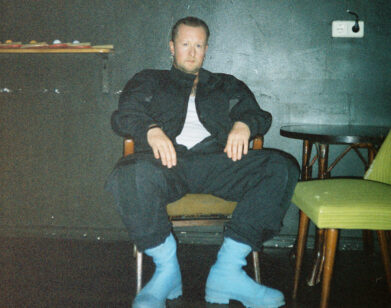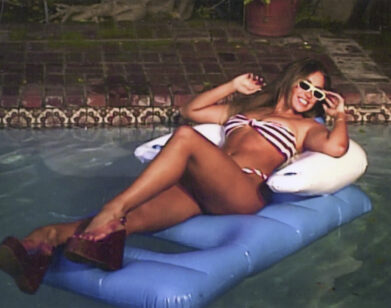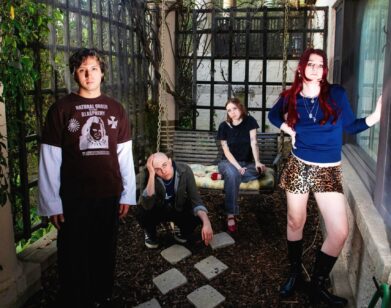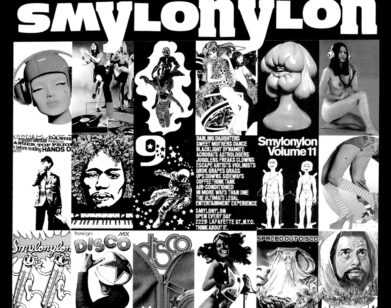The Kills Talk Fugazi, Tokyo, and Blood Pressures
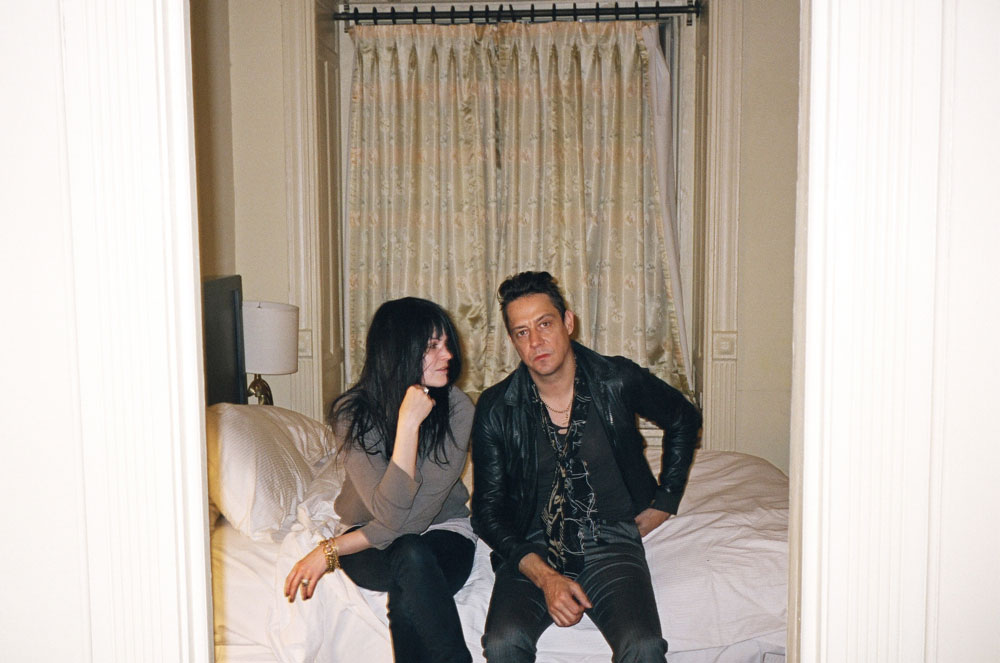
THE KILLS: ALISON MOSSHART (LEFT) AND JAMIE HINCE. PHOTOS BY JACK SIEGEL
The Kills’ Alison Mosshart has a husky voice, and Jamie Hince chain-smokes nonchalantly. They both have really great hair. Their music is the kind of spare, decadent heavy rock and roll that one associates with late nights; and they’ve provided the soundtrack for teenage debauchery on Gossip Girl.
And yet despite their rock credibility and their list of famous friends—Jamie is engaged to Kate Moss—the London-based band had remarkably mundane plans for their brief stay in New York. Jamie had purchased a new flash for his camera and pair of snow boots to deal with the “ice water” that was falling from the sky, and Alison got her nails done and had plans to play cards with her brother in the evening. Even rock stars are entitled to a bit of wholesome fun sometimes.
The Kills will release their new album Blood Pressures on April 5, and will play at South by Southwest this week before heading off an international tour. We caught up with the duo—who were understandably exhausted, having just arrived from Paris the day before and leaving the next—in the Chelsea Hotel to talk about music, touring, and the importance of aesthetics.
REBECCA PATTIZ: How long have you both lived in London?
JAMIE HINCE: Since about 2001, like 10 years. I’ve been there for years, but she moved to London in 2001.
PATTIZ: How did you like it, being American and living in England? Any culture shocks?
ALISON MOSSHART: Maybe a little bit, but not so much because I traveled a lot, since I was pretty young. The only time I had a culture shock and knew I was having it and thought I was going to die was Tokyo when I was like 16. I just didn’t know what was happening to me. Not Tokyo like you show up and someone’s waiting for you in a car to take you to a hotel. Tokyo like you’re sleeping on people’s floors and driving in a van with like way too many people in the middle of winter, and being like okay, this is crazy. There was nothing comfortable about it. It was completely nuts.
PATTIZ: Have you been back since?
MOSSHART: I love Tokyo, I’ve been several times. The first trip was just weird; it was a weird time. It was in the ’90s, and it was different then.
PATTIZ: Do you have a favorite city to play in?
MOSSHART: Probably Paris or New York.
HINCE: Parisians got the band really early on. I mean, there was quite a sort of ferocious buzz there when we first started, with our first single. And that immediately sort of endears you to a population. I always had such a great time there. I’m a sucker for that romance and dirt mixed together. Paris is just so beautiful, and it’s been such a great place for us. When we go there, we have such amazing adventures.
PATTIZ: So do you have a worst-show experience?
MOSSHART: Lollapalooza, that was one of my worst shows. We just played at like 3 in the afternoon; it was like the hottest, most miserable thing. My shoes were melting. I just thought I was going to die. It was the most horrible experience. I lasted, what, four songs? In front of quite a lot of people. That was one of my least favorites.
HINCE: That was an eye-opener for me. That was sort of an extreme American festival experience. I think after 9/11, you really saw the result of that on the rock scene in venues and security and rules. And you really got the feeling that there were a lot of rules that venue owners and perhaps even promoters wanted to install, and this was quite a good excuse to do so. It didn’t really have anything to do with playing a show. But there were a lot of rules, and at that time—I’m sure it’s not like that anymore—it seemed almost like the music was getting in the way of the rules. The headline band went on at 8 o’clock and it was hard to see any rock-and-roll spirit there at all. I understand why that happened, but it wasn’t particularly pleasurable.
PATTIZ: What did you listen to when you were in high school?
MOSSHART: Fugazi, that’s about it.
HINCE: Yeah, Fugazi was the thing that kind of brought us together, the love of that band. In high school I listened to The Jam, stuff like that, a lot of English bands, really. And then I got into anarcho-punk bands that nobody had heard of.
MOSSHART: It was kind of the same where I was from. All your friends were in bands, and the college kids who were a little bit older were in a lot of bands. So I was in a band, and I was listening to my friends’ bands and going to their shows and stuff. And not that many bands that people would know of really came to Florida, or we couldn’t go to their shows—we weren’t old enough or couldn’t afford to go. So we always had our own little scene with our own bands. But Fugazi was my band. That was the band that I loved.
PATTIZ: Did you ever get to see them play?
MOSSHART: I saw them play a lot, like thirty times or something. I drove around the country behind their van and saw them play every single night.
PATTIZ: So does Fugazi influence what you guys do?
MOSSHART: Definitely. Yeah. Those were quite important years.
HINCE: The way we’ve done things and the sound of it. I loved all that riot-grrl scene and Nation of Ulysses and Bikini Kill and Huggy Bear. I loved it. It was the moment sort of first growing up where bands had stopped looking like roadies. There was this whole movement of being like down to earth and just wearing t-shirts and whatever, and then these bands like Nation of Ulysses came along wearing suits, and the whole look of it was really important, and there was this really kind of radical statement to it. I really kind of bought into that.
PATTIZ: Do you consciously think about your look when you’re onstage?
HINCE: Not anymore. But I think it’s second nature, really.
MOSSHART: I think we’re really conscious of it. You know, I think we choose gear by the way that it looks. We choose lots of things by the way that it looks. I don’t like bands like look like roadies. I don’t like when I can’t tell who’s the guitar tech and who’s the guitar player. I really like it to be a performance or something that’s inspiring. Those things aren’t inspiring to me.
PATTIZ: Could you tell me about the recording of your upcoming album?
MOSSHART: We recorded the album in Benton Harbor, Michigan at a studio called Key Club. It’s a studio that is run by two really good friends of ours. We’ve been going there since we wrote No Wow. So this is the third record we’ve done there. And it’s like a second home to us.
HINCE: Somehow, the environment there, you just shut out of the rest of the world and sort of play and write and record all through the night, whenever we like. There’s no sense of getting up and having to be at a studio at 11 o’clock and finishing at 10 o’clock at night. Sometimes not playing music for a day is much more beneficial that playing every day for ten hours.
MOSSHART: With this record, we did things we don’t normally do. We got gospel singers for this record; there’s piano on it; there’s Mellotron on; there’s other instruments that we don’t normally use, so that’s exciting. And it took way less time than Midnight Boom.
PATTIZ: So you’re going on tour for this album. Are you looking forward to it, do you like touring?
MOSSHART: I love touring. I can’t wait. Everything is just normal when you’re finally on tour. I think for me it’s my happiest thing, I love moving around and I have friends and family all over the place. It’s kind of my time. It’s almost like home. It’s when I get to see everybody.
HINCE: And I really loved to be in the studio for this record. I had a confidence that I haven’t had as much with our last records and I got really sort of lost in it and loved it. But touring is a good antidote to being in the studio, and being in the studio is a good antidote to touring. So it has to go in that cycle.
PATTIZ: Do you ever think about what you would have done if you weren’t playing music?
HINCE: Life would be different if we weren’t making a living out of playing music. We’d still play music, but we’d have to have day jobs.
MOSSHART: I went to art school. I never really planned on playing music. But it was a thing I’d always done, since I was young. So it just carried me away; I never really had to make a plan for it or make any decisions. It just sort of decided on me. And I don’t know what the hell I would have done otherwise.
THE KILLS’ BLOOD PRESSURES IS OUT APRIL 5; HINCE AND MOSSHART WILL PLAY SXSW THIS WEEK.


